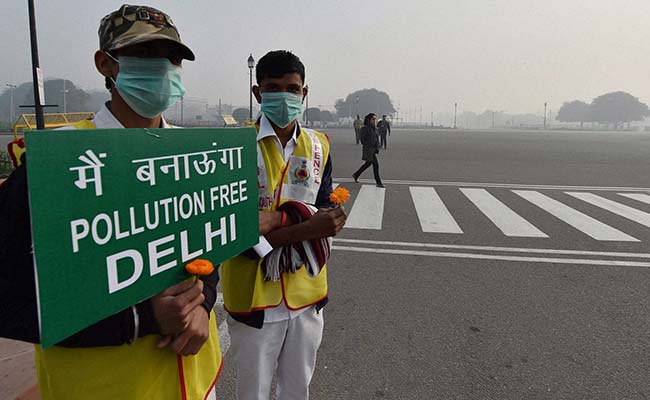
Delhi's polluted air claims up to 30,000 lives each year, according to the Centre for Science and Environment. (AFP photo)
New Delhi:
Delhi has proved it can match Singapore in discipline and systems, Chief Minister Arvind Kejriwal said today, as the capital ended a two-week traffic trial to combat its highly toxic smog.
"Lots of people talk about how great the system is in Singapore, elsewhere... but odd-even proved the same can be done here," said the Chief Minister, about the experiment that took a million cars off the roads and saw judges and diplomats carpooling, but has apparently made little obvious difference to air quality in the world's most polluted capital.
"Pollution did go down, yes... but there was also less traffic congestion. If you spent four hours on the roads, you could now do the same distance in two hours. Two hours added to your life and the irritation gone. There is a sense of peace in Delhi," said the chief minister, whose thank yous included a special mention for the Delhi Police, which he has battled for his entire tenure so far.
Shazia Ilmi, who quit Mr Kejriwal's Aam Aadmi Party on acrimonious terms to join the BJP, was quick to praise the odd-even scheme. "It made me rediscover the joy of driving in the city again... it shows that the city comes together for a good movement regardless of which party one belongs to."
 People, Mr Kejriwal said, liked fewer cars on the roads so much that they "are saying it should continue and they are willing to bear other difficulties to keep this rule going." His government has said it may adopt the scheme on a more permanent basis after analysis.
People, Mr Kejriwal said, liked fewer cars on the roads so much that they "are saying it should continue and they are willing to bear other difficulties to keep this rule going." His government has said it may adopt the scheme on a more permanent basis after analysis.
Arvind Kejriwal said it was not the Rs 2000 fine that made Delhi follow Odd-Even. "Delhiites are great, very cooperative," he said.
"For the first time, the middle class has been held accountable and done their bit towards damage control," said environmentalist Harsh Mander.
Shazia Ilmi, who quit Mr Kejriwal's Aam Aadmi Party on acrimonious terms to join the BJP, was quick to praise the Odd-Even scheme. "It made me rediscover the joy of driving in the city again... it shows that the city comes together for a good movement regardless of which party one belongs to."
Delhi's transport minster Gopal Rai claimed pollution had dropped by 20 to 25 per cent in the trial period in the capital.

Figures from the US embassy in Delhi showed PM2.5 levels were lower than on the first day of the trial, but air quality was nevertheless still "very unhealthy" on Friday morning, with PM2.5 levels at 156 -- six times the World Health Organization (WHO) safe limit.
PM2.5 refers to microscopic particles that penetrate deep into the lungs and are particularly harmful to health.
The city's filthy air claims up to 30,000 lives each year, according to the Delhi-based Centre for Science and Environment.
"Lots of people talk about how great the system is in Singapore, elsewhere... but odd-even proved the same can be done here," said the Chief Minister, about the experiment that took a million cars off the roads and saw judges and diplomats carpooling, but has apparently made little obvious difference to air quality in the world's most polluted capital.
"Pollution did go down, yes... but there was also less traffic congestion. If you spent four hours on the roads, you could now do the same distance in two hours. Two hours added to your life and the irritation gone. There is a sense of peace in Delhi," said the chief minister, whose thank yous included a special mention for the Delhi Police, which he has battled for his entire tenure so far.
Proud of u Delhi. U give me confidence "Together, we can achieve anything." 1st phase of Odd Even ends today. Will do again in improved form
- Arvind Kejriwal (@ArvindKejriwal) January 15, 2016Shazia Ilmi, who quit Mr Kejriwal's Aam Aadmi Party on acrimonious terms to join the BJP, was quick to praise the odd-even scheme. "It made me rediscover the joy of driving in the city again... it shows that the city comes together for a good movement regardless of which party one belongs to."

Commute times have reduced by up to 50 per cent, Arvind Kejriwal said.
Arvind Kejriwal said it was not the Rs 2000 fine that made Delhi follow Odd-Even. "Delhiites are great, very cooperative," he said.
"For the first time, the middle class has been held accountable and done their bit towards damage control," said environmentalist Harsh Mander.
Shazia Ilmi, who quit Mr Kejriwal's Aam Aadmi Party on acrimonious terms to join the BJP, was quick to praise the Odd-Even scheme. "It made me rediscover the joy of driving in the city again... it shows that the city comes together for a good movement regardless of which party one belongs to."
Delhi's transport minster Gopal Rai claimed pollution had dropped by 20 to 25 per cent in the trial period in the capital.

Figures from the US embassy in Delhi showed PM2.5 levels were lower than on the first day of the trial, but air quality was nevertheless still "very unhealthy" on Friday morning, with PM2.5 levels at 156 -- six times the World Health Organization (WHO) safe limit.
PM2.5 refers to microscopic particles that penetrate deep into the lungs and are particularly harmful to health.
The city's filthy air claims up to 30,000 lives each year, according to the Delhi-based Centre for Science and Environment.
Track Latest News Live on NDTV.com and get news updates from India and around the world

